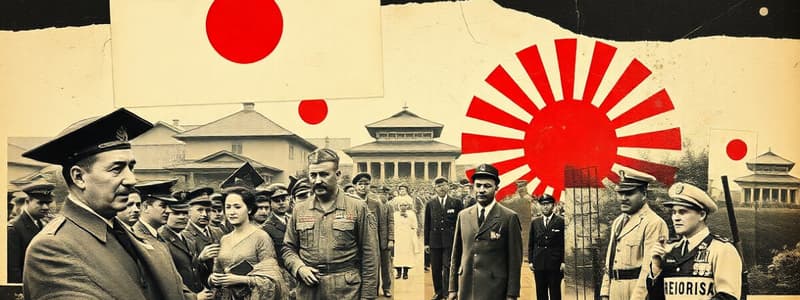Podcast
Questions and Answers
Which factor most significantly contributed to the rise of authoritarianism in Japan during the 1930s?
Which factor most significantly contributed to the rise of authoritarianism in Japan during the 1930s?
- The successful communist revolution that toppled the existing government.
- Japan's defeat in World War I, which humiliated the nation and led to widespread discontent.
- The Great Depression, which caused economic hardship and eroded trust in parliamentary democracy. (correct)
- The rise of a single, charismatic fascist leader who unified the country behind a clear ideology.
How did Japan's approach to dealing with those charged with political crimes differ from that of Nazi Germany and Fascist Italy?
How did Japan's approach to dealing with those charged with political crimes differ from that of Nazi Germany and Fascist Italy?
- Japan focused on 'resocializing' individuals to conform to traditional Japanese values. (correct)
- Japan exiled political criminals, permanently barring them from returning to the country.
- Japan publicly executed political dissidents to deter future opposition.
- Japan imprisoned political offenders in harsh labor camps for indefinite periods.
What was the primary focus of racial superiority ideologies in Japan during its authoritarian period?
What was the primary focus of racial superiority ideologies in Japan during its authoritarian period?
- The creation of a racially pure 'Aryan' society through selective breeding programs.
- Forced sterilization programs targeting individuals with perceived genetic defects.
- The systematic persecution and elimination of internal ethnic and religious minorities.
- The belief in the cultural and racial superiority of the Japanese people over foreigners. (correct)
How did the relationship between the emperor and the Japanese people influence the country's authoritarian trajectory?
How did the relationship between the emperor and the Japanese people influence the country's authoritarian trajectory?
Which of the following best describes the political climate in Japan during the 1920s?
Which of the following best describes the political climate in Japan during the 1920s?
What was the role of the military in the Japanese government during its authoritarian period?
What was the role of the military in the Japanese government during its authoritarian period?
In what way did Japan's economic recovery from the Great Depression bolster its authoritarian regime?
In what way did Japan's economic recovery from the Great Depression bolster its authoritarian regime?
Which of the following was a defining characteristic of the Radical Nationalism movement in Japan during the 1930s?
Which of the following was a defining characteristic of the Radical Nationalism movement in Japan during the 1930s?
How did censorship affect Japanese society during the authoritarian period?
How did censorship affect Japanese society during the authoritarian period?
What imperial desires did Japan develop during its authoritarian period that ultimately led to war?
What imperial desires did Japan develop during its authoritarian period that ultimately led to war?
Flashcards
Radical Nationalism/Revolutionary Right (Japan)
Radical Nationalism/Revolutionary Right (Japan)
An ideology characterized by extreme nationalism, disdain for parliamentary democracy, and a commitment to a government focused around the emperor.
1920s Japan
1920s Japan
The period in the 1920s when Japanese society and politics became more progressive, marked by growing social movements.
Great Depression (Impact on Japan)
Great Depression (Impact on Japan)
The economic crisis that severely impacted Japan, leading to distrust in parliamentary democracy and capitalism.
Japanese Emperor-Subject Relationship
Japanese Emperor-Subject Relationship
Signup and view all the flashcards
"Resocialization" in Japan
"Resocialization" in Japan
Signup and view all the flashcards
Changes in Japanese Public Life
Changes in Japanese Public Life
Signup and view all the flashcards
Study Notes
- Japan began moving towards authoritarianism in the 1930s, but was different from Italy and Germany because it was minimally involved in World War I.
- In the 1920s, Japan shifted towards democratic politics and its society became more progressive.
- The progressive environment allowed for tensions from Japan’s industrialization and modernization to surface, including protests, growing union membership, and a growing feminist movement being examples.
- The Great Depression caused distrust in parliamentary democracy and capitalism, paving the way for Japanese authoritarianism.
- Radical Nationalism, or the Revolutionary Right, gained prominence, sharing extreme nationalism, disdain for parliamentary democracy, and a commitment to a government focused around their exalted emperor.
- Unlike Germany and Italy, no large fascist movement or party gained power in Japan.
- Those charged with political crimes were "resocialized" instead of imprisoned or killed.
- Public life changed significantly, reflecting right-wing nationalism with military dominance and censorship.
- Japanese culture viewed the relationship between an emperor and his subjects as a father to his child.
- Similar to Nazi Germany, Japan's quick end to the Depression made the authoritarian government more popular.
- Authoritarian Japan shared commonalities with fascist Italy and Germany, but internally remained a less oppressive and politically diverse country.
- The role of the parliament declined, but military figures never governed alone.
- Japanese racial superiority was directed against foreigners, unlike the Jews in Germany.
- Similar to Germany and Italy, Japan developed imperial desires.
Studying That Suits You
Use AI to generate personalized quizzes and flashcards to suit your learning preferences.




